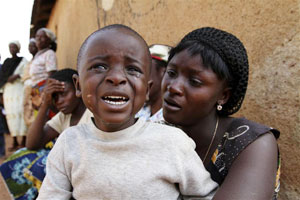
A boy sitting with his mother cries during a funeral for people killed in religious attacks in the Dogo Nahawa village, about 15 km (9 miles) to the capital city of Jos in central Nigeria, March 8, 2010. Credits: REUTERS/Akintunde Akinleye
The killing of hundreds of people around the Nigerian city of Jos has terrorised the local population. Caritas is running peacebuilding programmes and providing aid to those caught in the ongoing conflict, but say more needs to be done to provide security.
In the latest incident, between 200 to 500 people were murdered in raids on Sunday 7 March in nearby villages around Jos. Caritas Nigeria says warning signs were ignored by the government after similar raids in January and there is now a lack of confidence in the security force’s ability to end the killings.
“People are living in constant fear. They are afraid to sleep in their houses. Many hide in the mountains. The violence needs to be ended for good,” said Fr. Anthony Fom, Chairman of Caritas Jos.
Information on the number killed remains unclear, with parish priests saying they’ve buried over 200 and other sources saying the figure is much higher at 500 dead.
“There are rumours about new attacks all the time, but you never know how serious to take them. Even now, a few days after the last raid, the word is spreading about a new threat. People can never feel safe here”, said Fr. Fom.
On Sunday, villagers from Dogon Nahawa, Ratsat and Zot Foron, some 20 kilometres south of Jos were attacked during their sleep. In a raid lasting two hours, the attackers, believed to be Fulani Muslim herdsmen, murdered hundreds of villagers of the Berom ethnic group, who are mainly Christians.
Fr. Peter Audu, Secretary General of Caritas Nigeria said, “The Berom men had gathered in strategic locations to intercept potential attackers. They had been improvising their own security measures over the last months, because they felt that the government did not do enough to protect them.
“There were warning signs before Sunday, but the government ignored them. The villagers own protection means did not work though and they missed the attackers. So the victims, mainly women, children, disabled and elderly people, had to face these men, armed with machetes and other weapons, alone. They did not have any chance”.
The attack took place within the curfew period installed by the government to prevent violence, but security forces did not stop the attackers on their way to the villages.
Around 500 families have been displaced by the attacks and many have lost their belongings. Caritas will provide for them, distributing food aid, clothes, blankets and other aid material.
Caritas Nigeria is in close contact with Caritas members to help develop humanitarian aid and peacebuilding programmes.
Speaking from confederation’s global headquarters in the Vatican, Caritas Internationalis President Cardinal Oscar Rodriguez Maradiaga said, “We’re being updated by Caritas staff in Jos about these terrible killings. Caritas members around the world join together in condemning these acts. Such terrible crimes must not be allowed to happen again.
“We stand in solidarity with those who have lost loved ones and with the staff of Caritas Nigeria. Our worldwide confederation is ready to help support peacebuilding efforts.”
After the January attacks, Caritas helped 15,000 people with emergency aid. But the recurrent violence has deeply marked the population. Children made orphans by the attacks and other affected people will need long lasting support. Communities have been devastated and the population has lost hope.
“The government has launched an investigation about these attacks, but I am not very confident that things are going to change much. At the end of the day, there will not be justice”, said Fr. Audu.
The conflict is highly complex. Political, religious, economic and ethnic aspects play a role and are often intertwined.
Rev. Ignatius Kaigama, Catholic Archbishop of Jos said, “The root causes of the recurring crises must be looked into, examined and solutions proffered for permanent peace. There is a need to transcend the religious motives usually associated with the crises and to look for the social, ethnic, economic and political causes. There must be concerted efforts by the state governors to address the problems permanently.”
Caritas Nigeria, in cooperation with different international Caritas members, is setting up a project to encourage peacebuilding at the grassroots level.
“People don’t trust the security forces and have lost confidence in the government . Each groups thinks that it is being discriminated. With our projects, we want to bring people together at a grassroot level. Tensions between the groups exist, we have to acknowledge them. But they can never justify violence. People here need to learn that problems can be tackled peacefully”, said Fr. Fom.
The Catholic Archdiocese of Jos is organizing a Mass of solidarity for survivors on the 19th of March 2010 at St. Jarlath’s Parish Church Bukuru.
